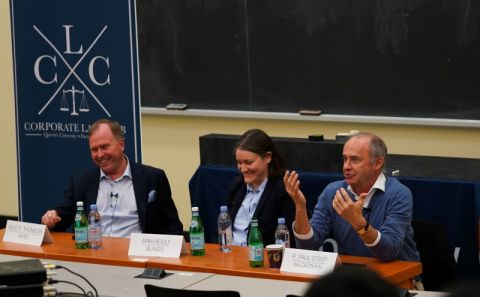
What’s a typical day in the life of a corporate litigator? How are technology and alternative dispute resolution (ADR) mechanisms affecting day-to-day practice? Is a career in corporate litigation right for me?
On February 4, Queen’s Law students got answers to these questions at the Future of Corporate Litigation panel. Part of the third-annual Careers in Business Law series made possible by a generous gift from the Class of Law’80, the panel was a collaborative effort between the Queen’s Corporate Law Club (CLC) and the Queen’s Business Law program. Opening remarks were provided by Professor Mohamed Khimji, the David Allgood Professor in Business Law, while CLC students moderated the event.
The panel featured three partners from some of Canada’s top business law firms:
- R. Paul Steep, Law’80 (Artsci’77), a partner with McCarthy Tétrault LLP and a Dean’s Council member;
- Kent E. Thomson, Law’82 (Artsci’79), a partner with Davies Ward Phillips & Vineberg LLP; and
- Erin Hoult, a partner with Blake, Cassels & Graydon LLP.
The panelists engaged on a wide variety of topics, including the impact of judicial resource availability on access to justice, the increasing use of ADR mechanisms, and the types of students best suited to careers in litigation.
Thomson acknowledged that while courts are implementing changes to make commercial litigation more cost-effective and expeditious, disputes solved by private arbitration continue to escalate and present significant barriers to justice for many. “Judges recognize that the increasing number of disputes solved outside the court system has a profound impact on our common law,” he said. “I hope to see our commercial court systems become more accessible and efficient, because judges really want to hear those cases.”
Steep elaborated on the relationship between those mechanisms and the future of corporate litigation. “Technology is breaking up a lot of established practices,” he noted. “You see that in many other professions, like investment banking and wealth management. While I don’t know for sure if that’ll happen on the commercial litigation front, dispute resolution mechanisms will continue to resolve a lot of the things I litigated as a young lawyer.”
For her part, Hoult offered her best advice to students considering a career in litigation. “I recommend figuring out what kind of learner you are, and plan your career accordingly,” she advised. “If you want to find a clear path towards a solution, this job will not satisfy you. Litigators’ key skills are curiosity, resilience and lateral thinking. Be willing to abandon your theory of the case if different information challenges it. Be willing to go down rabbit holes. Be willing to see where the evidence takes you.”
CLC executive member Colette Koopman, Com’19/Law’20, who attended the panel, was most interested to hear the panelists’ thoughts on the role of a litigator and the opportunities available to all lawyers interested in following that path. “Litigators may not negotiate deals, but they still play an essential role on the team,” she said. “The earlier they foresee problems, the more effectively they can prevent them. I was inspired by the opportunities open to all lawyers to pursue advocacy, get involved in litigation, and consistently find ways to apply their expertise.”
Koopman was equally moved by the panelists’ discussion on the issue of access to justice. “In courses like Civil Procedure, we talk a lot about balancing access to justice with the efficiency of our court systems,” she said. “The fact that these issues are equally pressing to practising lawyers in this field really stood out to me.”
By Justin Murphy
Watch a video of the Future of Corporate Litigation panel discussion.